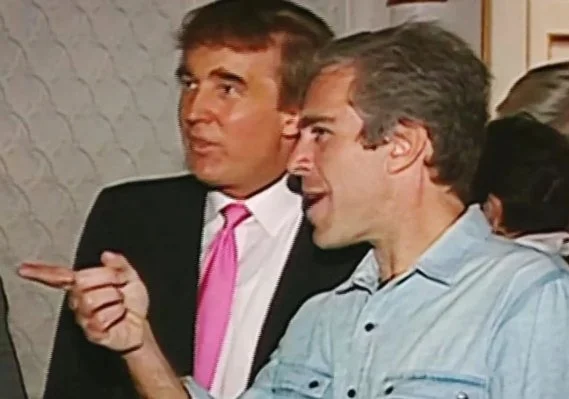Red Riding Hood and the Epstein Case: A Comparative Analysis of Predators and Victims
In one of our oldest cautionary tales, a young girl steps into a forest. She's warned clearly to stay on the path, a symbolic command to remain safe, obedient, and compliant. Yet, she wanders. She trusts. She encounters a wolf, and ultimately, she suffers for it. The story of Little Red Riding Hood has endured not simply because it is entertaining, but because it acts as a deeply embedded cultural script. It subtly but powerfully conveys a troubling lesson: when harm befalls a girl, responsibility rests squarely on her shoulders. She strayed. She trusted. She disobeyed. Thus, she bears the blame.
This narrative is not limited to fairy tales; it permeates society's response to real-world tragedies, particularly those involving sexual violence, exploitation, and abuses of power. While conducting a psychological exploration into Little Red Riding Hood, I was struck by how profoundly the tale mirrors contemporary cases of predation, none more vividly than the harrowing saga surrounding Jeffrey Epstein, Ghislaine Maxwell, and the hundreds of young women victimized by their actions.
Just last week, Ghislaine Maxwell spent over nine hours behind closed doors with U.S. Deputy Attorney General Todd Blanche, offering information on approximately 100 influential individuals implicated in Epstein’s trafficking ring. This conversation took place under "Queen for a Day" immunity, allowing Maxwell to speak freely without fear of further prosecution, a privilege denied to her victims. As survivors and the public clamour for transparency, what we observe instead are negotiations shrouded in secrecy, power reinforcing its protective barriers, and truth deferred indefinitely.
This process is not justice; it is the logic of the wolf, cloaked in institutional legitimacy.
The Psychology of Blame
Psychologists have extensively studied the phenomenon of victim-blaming, especially in cases of sexual violence. A particularly pervasive finding is the tendency to protect powerful or socially respected perpetrators by deflecting scrutiny onto the victims themselves. This psychological response emerges from what is termed the "Just World Hypothesis," the deep-seated belief that the world is fundamentally fair and just, and that individuals receive outcomes consistent with their actions. When someone suffers harm, our minds instinctively search for reasons that suggest the victim must have erred. Accepting the existence of genuine predators disrupts our comforting illusion of fairness.
This dynamic is tragically evident in the Epstein-Maxwell scandal. Many of Epstein’s victims were young girls from vulnerable and marginalized backgrounds, making them easy targets for public skepticism and blame. Society responded with pointed questions: Why did she visit Epstein’s mansion? Why did she accept his money? Why did she return after experiencing abuse? These inquiries are not born out of genuine curiosity or concern; rather, they serve as a subtle psychological mechanism to transfer guilt onto victims, requiring them to justify their very presence in the metaphorical forest.
Contrast this with the treatment Ghislaine Maxwell now receives within the legal system. Despite her federal conviction for sex trafficking, Maxwell is granted protected space to negotiate behind closed doors, her testimony hidden from public scrutiny. No cameras record her admissions, no transcripts fully released to survivors or the public. Her privileged status as a source of information positions her not as a predator held accountable, but as a powerful individual whose voice is valued and safeguarded. Meanwhile, survivors still battle to have their truths heard openly and respected fully in courtrooms.
This glaring disparity underscores a troubling psychological truth: our collective reflex remains to shield the wolves while interrogating the girls.
Structural Wolves
To portray Epstein and Maxwell as mere aberrations in society is not only inaccurate—it is dangerously naive. Like the wolf in Red Riding Hood’s woods, they were not isolated monsters; they operated openly, shielded by the powerful institutions and individuals around them. Epstein's extensive connections included billionaires, renowned politicians, royalty, and respected scientists—all aware, many complicit. Institutions that purportedly represent social responsibility actively sought his patronage, even after his criminal history became public knowledge, accepting his tainted money and reinforcing his legitimacy.
In 2024, unsealed documents revealed extensive involvement from prominent political figures across both major U.S. parties—names appearing in Epstein’s flight logs, personal records, and court depositions. Yet astonishingly, none of these influential figures have been seriously investigated, let alone charged. Their silence remains protected behind legal technicalities and societal apathy. The public has repeatedly been placated with the hollow defense that mere association doesn't constitute guilt. But silence and secrecy, especially from the powerful, are not neutral—they are complicit.
Survivors remain trapped in painful uncertainty, continuously retraumatized every time predators are given platforms, media attention, or lenient deals. The wolves walk freely through the forest, protected by systemic privilege, while the victims’ cries for justice are consistently drowned out by those with the power to silence them.
“Rather than warning girls not to stray from the path, we should be warning wolves not to hunt in the first place.”
A Script That Protects Power
In an earlier essay exploring the story of Red Riding Hood, I observed, “The message isn’t ‘Men shouldn’t harm women.’ It’s ‘Women should prevent men from harming them.’” That idea could serve as the subtitle of the entire Epstein-Maxwell scandal. Society’s deeply ingrained narratives about victimhood and accountability are revealed starkly in how this case continues to unfold.
At every turn, survivors of Epstein’s crimes have been instructed—implicitly and explicitly—to wait patiently, to trust a system that repeatedly betrayed them, and to believe that justice is quietly taking place beyond their view. But what reason is there for such trust? The very institutions now tasked with delivering justice are those that, for decades, deliberately ignored or actively concealed Epstein’s abuse. The wolves are permitted to roam, protected by law and custom, while victims are sternly reminded to stay obediently on society’s path, never straying, never demanding accountability too forcefully.
Even the procedural structure of legal storytelling reinforces this harmful narrative. Figures like the late Virginia Giuffre, who courageously stood against powerful men, are continually cast as peripheral characters rather than central voices. Courtroom battles rarely focus on victims' lived experiences or moral reckonings, but instead devolve into convoluted disputes over technicalities, immunity deals, jurisdictional questions, and procedural manoeuvring. Morality is neatly excised from legal discourse, allowing power to evade the uncomfortable demand for explanation or accountability.
Ghislaine Maxwell’s carefully managed cooperation exemplifies this dynamic. Her testimony is not evaluated for its moral clarity or truthfulness, but rather appraised for its strategic value. Her admissions (potentially explosive and revelatory) are diminished into bargaining chips, commodities exchanged quietly in the shadows of power. Behind Maxwell stand countless influential figures, protected by layers of privilege, law, and procedure, determined to obscure their identities and escape the spotlight they so richly deserve.
This is the script of a society deeply invested in protecting predators and their enablers. It is a narrative we must rewrite if we ever hope to deliver true justice to the survivors of this tragedy.
The Cost of Silence
Who benefits from secrecy, delays, and carefully managed disclosures? Certainly not survivors, nor the public seeking accountability. Only the predators—those still hiding in the shadows of power—truly gain from the protracted opacity surrounding Maxwell’s revelations.
Disturbingly, figures within the Department of Justice and political allies linked to the Trump administration have already been implicated in attempts to control, stall, or minimize the fallout from Maxwell’s cooperation. The involvement of individuals like Pam Bondi, Trump’s former impeachment lawyer now tasked with overseeing the release of Epstein-related documents, vividly illustrates institutional collusion, a calculated scenario where foxes guard the henhouse.
If even a small fraction of the names Maxwell revealed remain in influential positions across politics, finance, or media, the delays are not merely bureaucratic inertia—they constitute deliberate strategic protection. Furthermore, if the eventual disclosures selectively highlight political opponents or foreign nationals, they risk becoming cynical tools of manipulation rather than genuine instruments of justice.
This sustained silence is neither incidental nor benign; it is the calculated preservation of power at the expense of survivors and truth.
Simply Put
Red Riding Hood endures as a cautionary tale precisely because it conceals social control beneath a veneer of safety. But the lesson was never about the dangers of straying off the path, it was always about a society that blames the vulnerable for wandering rather than condemning the predators for lurking.
In a just society, girls would roam freely without fear. Predators, not victims, would bear the burden of vigilance. Justice would never be negotiated behind closed doors but would unfold openly, naming names, holding power accountable, and amplifying survivors' voices.
To survivors of Epstein, Maxwell, and every predator shielded by institutional power: this system has profoundly failed you, yet your courage endures. Your voices resonate loudly, and the forest, the world, is watching.
It's long past time we stopped warning girls to tread carefully. Instead, let’s make the wolves afraid.








